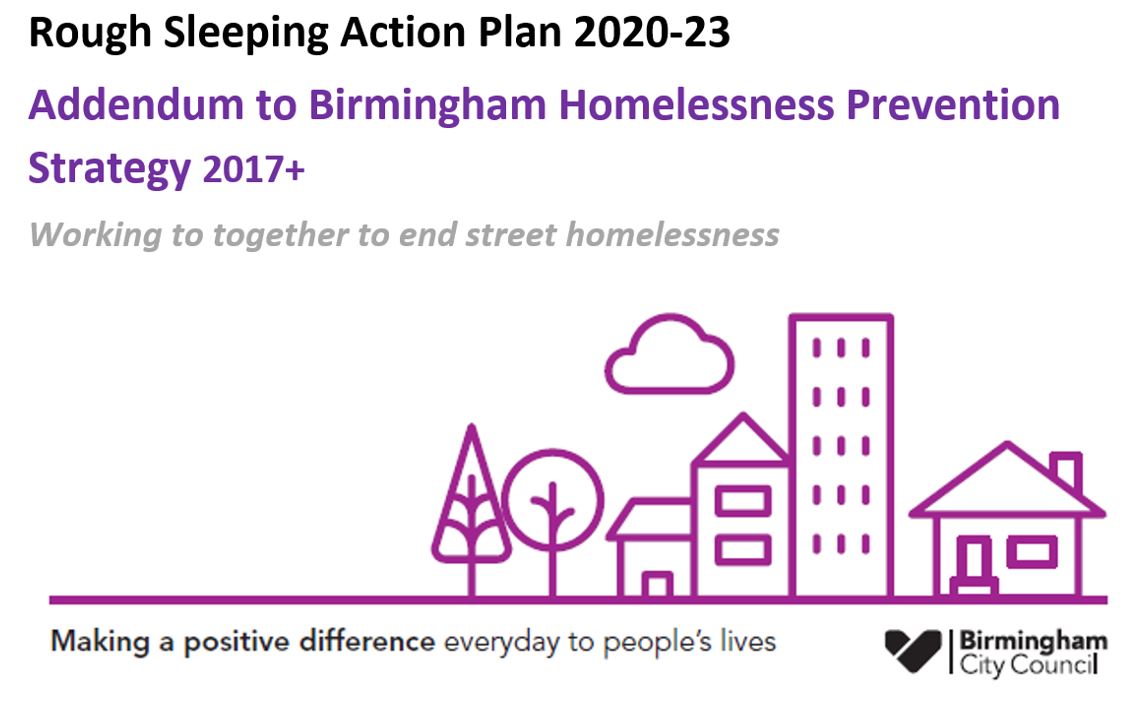Rough Sleeping: Homelessness Strategy Consultation
Results updated 8 Dec 2020
Consultation Outcome
Rough Sleeping Addendum to Birmingham Homelessness Prevention Strategy
The Rough Sleeping Addendum: Working to together to end street homelessness, supplements Birmingham’s overall Homelessness Prevention Strategy laying out key areas of work and action in response to rough sleeping across the city.
Between August and early October 2020, on-line and in-person consultation was undertaken on the overall approach of the strategy, five specific priority action areas as well inviting views of what else the strategy should include.
In-person consultation was specifically targeted at rough sleeping communities which was made possible by professional teams involved in the delivery of rough sleeping services across Birmingham throughout the COVID pandemic. Including all responses received, a total of 93 responses were recorded which included 26 individuals with lived experiences of rough sleeping and homelessness.
The outcome of the consultation work indicates that there is very strong consensus and support for the overall “preventative pathway led approach” of the strategy – with 89% in agreement; 8% unsure and just 2% in disagreement. Similarly, with regards to the five specific levels of actions set out in consultation there has been a strong level of overall support: -
‘Universal Prevention’ – pre-emptive collaborative action across organisations and at wider community level on raising public awareness and learning to continuously improve services and response to rough sleeping 88% in agreement; 11% unsure; and just 1.3% in disagreement.
Targeted Prevention’ for groups at disproportionate rough sleeping risk including, care leavers and young people, vulnerable adults, prison leavers (offenders), people affected by domestic abuse. 88% in agreement; 8.5% unsure and 2.3% in disagreement.
‘Crisis Prevention & Relief’- Time critical interventions to respond to rough sleeping at the point of crisis such as outreach support and emergency accommodation. 90% in agreement and 10% unsure, 0% disagreement.
‘Recovery’ – multi-agency personalised support to keep people from returning to the streets through improving efforts to maintain tenancies, sustain and improve health, economic and social wellbeing. 93% in agreement and 6% unsure. 0% in disagreement
‘Move-On’ – actions specifically linked to ensuring that there is a supply of short-term and longer-term transitional accommodation necessary to provide former rough sleepers with a route out of emergency accommodation. 80%in agreement; 18.5% unsure and; 1.2% in disagreement.
The consultation also highlighted the value of involving service users and people with lived experience of rough sleeping, who can play a key role as part of the overall strategy. The Rough Sleeping Addendum now includes a specific commitment to do this, alongside building upon the sustained reductions in rough sleeping.
For more information on the results and feedback from the consultation see additional files:-
- RS Addendum Consultation Findings Report, Nov 2020 (PDF file)
- Collated response from 6 People with Lived Experience of Rough Sleeping Group produced by SIFA Fireside - (PDF file)
- Amended Rough Sleeping Addendum strategy document.
For the purposes of transparency, a full set of 86 individual responses to the consultation are also available which can be accessed through zip file (all personal information has been redacted).
Files:
- RS Addendum Consultation Findings Report_Nov 2020.pdf, 2.0 MB (PDF document)
- SIFA_Collated_Lived Experience_Sept 2020.pdf, 83.9 KB (PDF document)
- Rough Sleeping Addendum_Amended Strategy.pdf, 261.4 KB (PDF document)
- Redacted Surveys.zip, 982.9 KB (Zip archive)
Overview
We are consulting members of the public on our Rough Sleeping Addendum. Forming part of our overall Homelessness Prevention Strategy this document specifically sets out the approach and key areas of action being taken in response to rough sleeping over the next three years.
The data collected through the survey is anonymous, so you cannot be identified from what you have said. We plan to publish the findings from the survey at a population rather than an individual level (for example in numbers and graphs using summary results). Any quotes used from answers will remain anonymous.
Further details information and details about this consultation are found in the following three related documents:
- Rough Sleeping Addendum Consultation Document.
- Rough Sleeping Addendum 2020 Strategy Document.
- Rough Sleeping Needs Analysis (January 2020).
Why your views matter
Over the last three years there have been several significant local and national developments relating to rough sleeping. This consultation will help inform our strategy which we will publish later this year.
What happens next
Your views will help us shape the final version of our strategy by establishing a comprehensive set of priority actions for the next three years in response to rough sleeping in Birmingham. Alongside this online consultation, council officers will be meeting key community and service stakeholders including people with lived experience of rough sleeping.
A report detailing the final outcome of this consultation will be availabe in October 2020.
Areas
- All Areas
Audiences
- Anyone from any background
Interests
- Democracy and Participation
- Care & Support for Adults
- Children & Young People
- Faith & Religion
- Older people issues
- Voluntary Sector
- Health & Wellbeing
- Crime & Community Safety
- Equality & Human rights
- Education
- Regeneration
- Housing
- Homelessness
- Employment
- Health Services


Share
Share on Twitter Share on Facebook